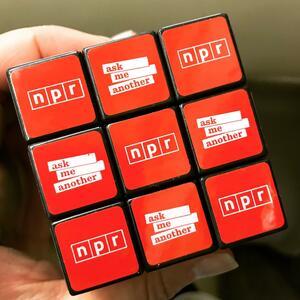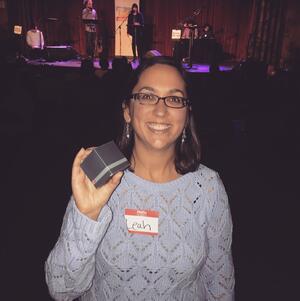That Time I Apologized for Winning
Recently, I auditioned to compete on a radio game show of puzzles, word games, and trivia. I completed an online test—or rather, about two thirds of it, it was impossible—and a phone interview, to make sure I was interesting enough for the “banter-with-the-host” section of the show. I was psyched to be selected, and made plans to attend the taping with another clergywoman, whom I called my “emotional support priest.”
“Are you nervous?” she asked as we boarded the train.
“Not really.” I assured her that, since there was no way to study, and the prize was a Rubiks’ Cube, the stakes were pretty low. My only goal, I told her, was not to embarrass myself on the radio. That was the only thing I was really nervous about.
When I took the stage for the first round, I felt confident. The show’s producer had oriented us, and assured us that the hosts were nice and that we would be fine. I usually kept up when I played along with the radio, and my opponent looked nervous enough herself.
This would usually be the part of the story where I froze, fell on my face, said something stupid, or swore on National Public Radio. But when the game began, something even more surprising happened.
I proceeded to completely destroy my opponent.
As it turns out, I’m pretty good at word games, and I like to win. Once I figured the pattern of the game, I was able to answer the questions quickly and correctly. I didn’t even have a problem with the buzzer, as I’d feared.
Somehow, I also had the mental bandwidth to realize that my behavior made it apparent that I was completely uncomfortable with winning.
In the first round, I answered each question with an upward inflection, implying that I wasn’t sure, even when I was. This phenomenon, known as “up-talk,” is a decidedly gendered way of speaking.
In the second round, I hung back a second after a really easy question. I had been so worried about embarrassing myself that I was now concerned that my opponent would be humiliated if she didn’t get to answer any questions. Then, of course, she got two in a row and I had to step it up again.
But the most ridiculous thing I did was halfway through the first round, when I turned to my opponent after answering a question correctly and mouthed, “I’m sorry.”
That’s right, studio audience. I apologized for winning.
Why did I do this? Was it …
A) The questions were silly, and I felt weird excelling at something so trivial and ridiculous?
B) As a woman, I was socialized not to show off, and this felt like showing off?
C) I assumed that—even though my opponent was clearly a successful professional woman with a talent for dancing (as we’d learned in the “banter-with-host” section)—my opponent was emotionally fragile and wouldn’t be able to handle the loss?
D) All of the above?
Women get a lot of criticism for “up-talk,” but it’s no surprise that we use it. Many of us find it preferable to being labeled a “know-it-all” or “bossy” or any other words that are tossed our way when we act in a way that is traditionally masculine. We are told, when we succeed, that we are “intimidating” and “threatening” and that people—particularly men—won’t want to be around us.
(I’m uncomfortable even writing this piece, because it feels like I’m bragging about my word-game ability, rather than trying to explain something about gender norms).
Even if I was trying to be “nice” to my opponent, my apology for winning, in a way, was a decidedly un-feminist act. My opponent was a grown woman, a lawyer. Not that we don’t all have our insecurities, but why should I assume that she’s not strong enough to handle a trivia-night loss?
At the end of the show, the other first-round winner and I were brought back to the stage for a final face-off. This time, my opponent had proven himself already, so there were no qualms about trying my hardest to beat him. I really did have to try my hardest, because he was sharp. But so was I. Abandoning the “up-talk,” I answered every one of my questions like I knew the answer, because I did.
And not that it matters, but I won.









I think it was "B", which helps to define so many of our lives. I'm so glad you got past that and allowed yourself to win. Incidentally, I once did'nt make it on to a game show, because I failed "banter". So I doubly happy for you that you also made it through that barrier. Enjoy your victory.
In reply to I think it was "B", which by Barbara G. Bornstein
Spot on with this write-up, I really believe this site needs far more attention. I'll probably be returning to read through more, thanks for the advice!